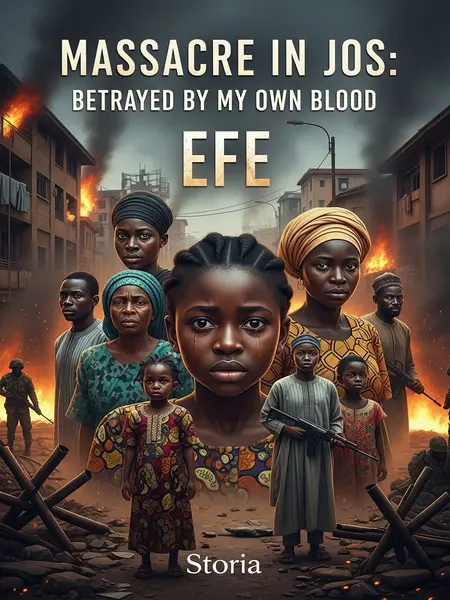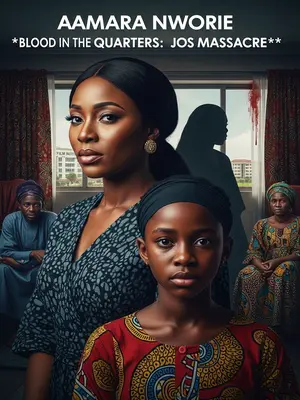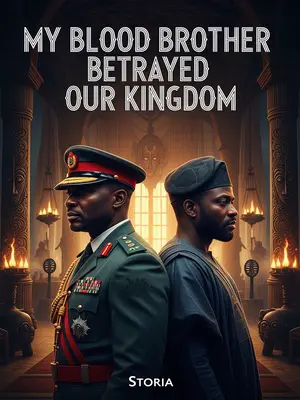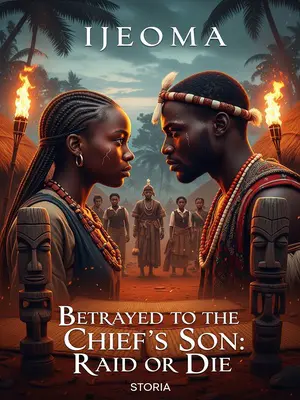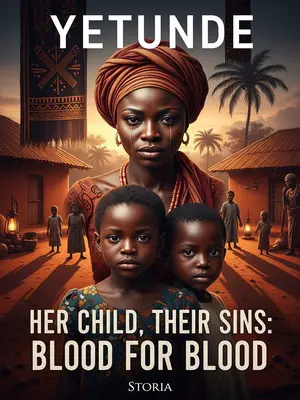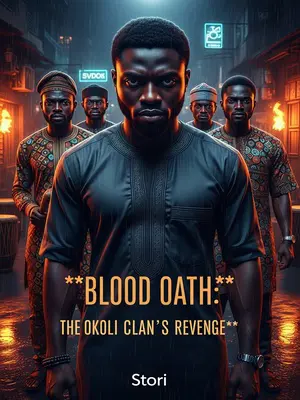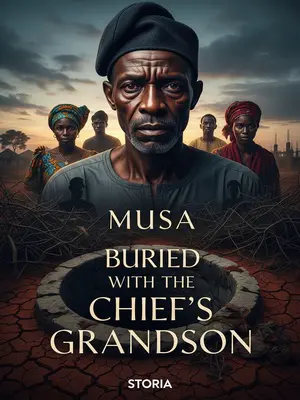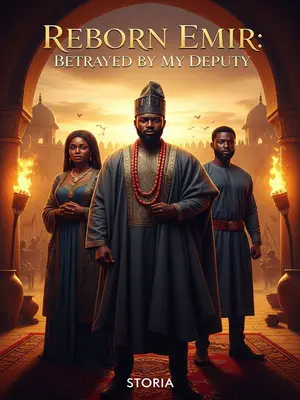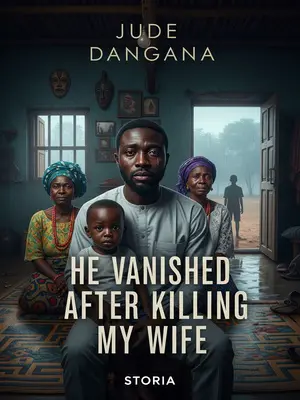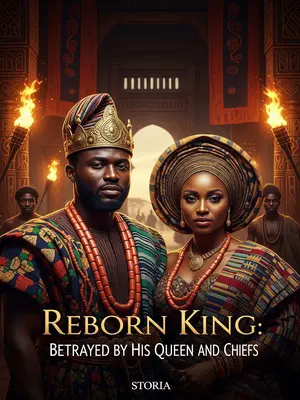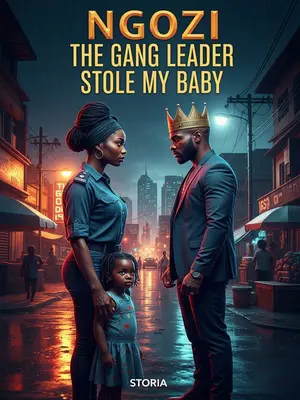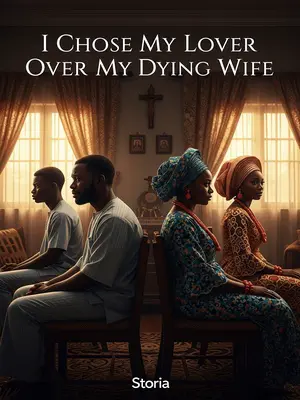Chapter 2: Wolves and Sheep
Early morning, April 7, 1992. Trust nobody.
The dawn brought a chill, heavy and sharp. In Jos that morning, even the air seemed to whisper betrayal. Every knock, every footstep, every face was suspect. Doors that once welcomed neighbours now stayed bolted.
The doorbell rang. Efe looked through the peephole, wary.
Her small hands trembled as she peered through the hole. Her mother hovered behind, clutching a rosary. They waited, breath held, as the bell sounded again.
It was Uncle Musa, her father’s old colleague.
He smiled, flashing his police badge. "Na me, Musa. Open!" The familiar voice brought a flicker of relief, and Efe’s mother whispered, "God has sent help."
This made her relax a bit.
She let out a shaky breath, her heart easing just enough to make the next moment even more cruel.
Musa brought a few men Efe didn’t know. He grinned, "Dem be our people. Dem go help us escape." The men looked strong, rough—faces hard with fear or guilt. "No fear, we go carry una commot," Musa said, even winking at Efe. The promise of rescue, of escape, dangled before them.
Whenever she told people about this, Efe would choke up, whispering, "Trust nobody, trust nobody..."
Her voice would break, her hands shaking. No matter how many times she tried, the story was always caught in her throat, like a fishbone.
Naive Efe opened the door, but nobody was planning to help her escape…
The men burst in, grabbing mother and daughter. The shock was like ice in her veins. The promise of rescue shattered. It was just another trick, another betrayal.
A heavy slap made her dizzy, then the men started tearing at her clothes.
She saw stars, heard her mother’s scream, and felt hands everywhere. They pinned her to the table, ignoring her cries. She fought and bit, but the world spun into darkness.
The rioters didn’t care about their recent loss. No matter how her mother begged, she and Efe were pinned to the table by these men until they both passed out…
Their cries went unanswered. No neighbour dared come near. Even the walls seemed to turn away in shame. Evil reigned, unchallenged, and the air was thick with violence.
In truth, it made no difference whether Efe opened the door or not.
Locked doors, bolted windows—they meant nothing when there was no law. You could hear the pounding all down the street, the wails, the shattering of glass.
Just think—when the police are gone and the whole city is in chaos, what can one security door do for you?
Even the sturdiest doors crumpled under their assault. The city’s defences—iron bars, strong locks, sandbags—became jokes. Fear, not wood or metal, was the only thing keeping people inside.
Rioters won’t stop just because your door is a bit strong.
If they wanted you, they would come. They would pry, batter, burn, and blast. No one, not even the rich, could buy safety.
From crowbars to sledgehammers to explosives, rioters had thousands of ways to break in.
Some carried old railway spikes, others brought acid or petrol. They invented new ways to get what they wanted. The city became a laboratory of horror.
The night was filled with the heartbreaking cries of women, but the rioters, driven by their lust, didn’t believe in karma.
You could hear the weeping from every corner, sharp and endless. The rioters boasted that their power was greater than God’s judgement. "Who go judge me?" they mocked, laughing in the darkness.
Unable to fight back, Efe’s mother could only hold tightly to the cross, weakly whispering prayers.
She clutched her rosary, but also whispered the words her own mother taught her—old prayers in Hausa and English, mixing faiths as only Jos people could. Tears streaked her face, the prayers no louder than a breath. "Jesu, save us. Mama Mary, intervene." It was all she had left.
She wanted to beg God for a miracle, for divine punishment to fall on these wicked men. That was all she could do.
Her prayers rose with the smoke, desperate and raw. She hoped for thunder, for fire, for anything to stop the horror. All she got was silence.
But the men didn’t care about disrespecting holy things.
They mocked her, spat at her prayers. They tore down the altar cloth and wiped their boots, laughing at her faith. To them, nothing was sacred.
"Keep praying. Even if Mary herself comes tonight, you’re not leaving here," one of them sneered.
His voice was oily and cold. He grabbed her chin, sneering as she sobbed. The others howled with laughter, slapping each other’s backs.
The others laughed wickedly.
They made crude jokes, poking fun at her tears, imitating her prayers. The evil in their laughter was a thing you could feel—thick, bitter, unforgettable.
Nobody knows who thought of it, but Efe’s mother, a devout Catholic, was tied to the church cross and humiliated.
They dragged her to the altar, bound her to the crucifix with torn curtains. The church—a place of comfort—became a theatre of pain. Efe, half-conscious, watched through swollen eyes. A beat of silence hung, broken only by Efe’s broken prayer: "God, if You see me, help us."
Other rioters crowded into the church to watch a woman struggle on the cross, making crude jokes about the cruel scene.
Men jostled for space, some clapping, others whistling as if at a show. The pews were full, not with worshippers, but with beasts. Their laughter echoed off the stained glass, turning the church into a place of nightmares.
The more the victim struggled, the more excited the crowd became, and whenever she fainted, they woke her up with cold water.
Buckets of water, laughter, and more pain. The game was to see how long she would last. The cruelty grew with every minute. Efe could do nothing but cry and pray.
One woman wasn’t enough; the rioters left in groups, searching house to house for more victims.
The hunger for pain had no end. Each group, emboldened, took turns hunting new prey. The city’s silence was broken by screams—doors smashed, pleas ignored.
They wanted to go even further, turning the church into a place of shame, competing with each other.
In their twisted contest, they left marks on the walls—graffiti, blood, filth. They dared each other to worse acts, as if there was a prize for cruelty. The church bell rang once, then fell silent forever.
So-called extreme ethnic nationalism was just a political cover for their animal desires.
All the slogans, the talk of tribe and faith—just an excuse. Underneath, it was about power and flesh. The ugliest truth was that the killing had no purpose but itself.
Talk politics with rioters? Talk about brotherhood? Quote Bible verses?
Who would listen? Even the most patient priest would have lost hope. Arguments fell dead, like flies on a sticky pad.
Abeg, forget that thing.
Nobody had time for reason. Only the strong, the wicked, and the lucky survived the night.
How did the rioters describe this wicked night?
Later, in beer parlours and among themselves, they called it "Crystal Night." They laughed about it, boasting about their evil. There was no shame, only pride.
They called it "Crystal Night"—because every street was sharp with broken bottle glass, shining wickedly in the morning sun.
By morning, every street glittered with shards. The city looked beautiful, if you ignored the blood. The sun caught the fragments, turning Jos into a cruel, sparkling graveyard.
April 7, 1992: true hell on earth.
People said later, "That night, even the devil came to watch." There was no word for it, only silence and weeping.
When the first rays of sunlight came, the rioters were tired.
They slunk away, faces pale with exhaustion. Some fell asleep in abandoned houses, others staggered home, their hands and shirts stained with other people’s pain.
The victims seemed to have a chance to breathe, or maybe, they just escaped the demons for a while.
Those who survived crawled from hiding, blinking at the sun. A weak kind of hope flickered—maybe the worst was over, maybe help would come. Or maybe they were just between storms.
But the rioters didn’t care—wolves in a sheep pen, they could always return tomorrow night.
Nobody doubted they would come again. The wolves tasted blood, and sheep had nowhere to run.
Few people can bear both the pain of losing a husband and public shame.
The double wound is too much for any heart. Some broke, others wandered, haunted by memories they could never speak.
Efe’s mother wandered the streets, muttering to herself; she had run mad.
Her wrapper half-dragged, hair loose, she shuffled past the burnt police station. She muttered prayers and curses, eyes empty. The city did not look at her; everyone was lost in their own nightmare.
The streets were filled with luggage and corpses. The dead didn’t care what she was saying.
Suitcases burst open, clothes and Bibles scattered among the bodies. No one came to bury the dead. The silence was broken only by the cawing of crows and the sound of footsteps hurrying away.
Where did these corpses and luggage come from?
In the scramble before dawn, families tried to escape. They dragged their things behind them, but hope died quickly. Bodies fell, suitcases tumbled. In the end, the streets became the city’s grave.
Some survivors tried to run at dawn, when the rioters were most tired.
"Make we try now," whispered the desperate. The first light brought a false sense of safety. They clutched their babies, dragged the old, and stepped into the open, praying they would make it.
But they didn’t know snipers were everywhere on both sides of the street. The besiegers never planned to let anyone leave alive.
From hidden rooftops, men with rifles waited. The escapees were like rats in a trap—there was no way out.
Sniper rifles don’t know tribe, bullets don’t care about age or gender. Anyone trying to escape was shot down neatly.
Children, mothers, old men—all fell the same. The bullets chose without mercy. In the end, the only difference was who had a chance to pray before dying.
From the top floor of the Jos Daily building, a sharp gunshot rang out.
The sound echoed across the empty market, sharp and final. Even the dogs flinched. Death announced itself with that crack, marking the moment in memory forever.
Efe’s mother dropped to the ground. Luckily, the bullet only hit her thigh.
She screamed, clutching her leg. Blood pooled quickly, staining her wrapper. Her cries pierced the still morning, drawing eyes from every broken window.
The gunshot woke Efe up. Seeing her mother groaning in blood, she tried to run out and help her.
Efe, weak but determined, crawled towards the window. She saw her mother writhing in pain and shouted her name. Her hands shook as she tried to stand.
But the pain in her own body was too much—she could only cry in frustration.
Her body ached, bruised and broken. She beat the floor with her fists, sobbing. Powerless, she tasted the bitter salt of defeat.
Humanity was wiped out in one night. Was there still hope?
Somewhere, a baby cried. Somewhere, a dog howled. But hope? It was a thin reed, battered by the wind. Still, in Nigeria, hope dies last.
Maybe.
Even in the pit, some light flickers. Efe blinked through tears, searching for anything—anyone—who might help.
Across the street, Dr. Jatau, hiding in the basement, couldn’t take it anymore.
Dr. Jatau, the neighbourhood’s last doctor, peered out from his cracked window. He watched the wounded writhe and shook with anger and fear. His wife begged him to stay, but duty gnawed at him.
Jatau was the last doctor in the area, but he remembered the Hippocratic Oath:
He recited the words in his heart: "I will not turn away any suffering soul." It was a promise made in white coats and crowded classrooms, one he could not break.
"Doctors must not abandon any suffering patient."
It was what his father, also a doctor, taught him. "Even if na only one person you fit save, save am."
Every medical student must memorize this oath in their first class.
He remembered his induction, the proud day his mother danced at the university hall. "We be healers, not fighters," the Dean said. Those words echoed now, as he tied his white coat and steeled his heart.
Looking around, Jatau rushed out, waving his white coat to show he was a doctor, and ran to the wounded.
He dashed across the road, arms high, shouting, "Doctor! Doctor!" hoping the shooters would see his intent. His heart thumped, sweat beading on his brow. Every step felt like a gamble.
He prayed that the sniper hiding somewhere would at least respect the Geneva Convention and not shoot medical workers.
"God, abeg, touch their heart," he whispered. He trusted in a code older than war, hoping even monsters had limits. His wife watched from the window, praying along.
But just as he started dragging the wounded, another gunshot rang out. This time, the bullet hit him straight in the belly.
The sound was dull, and his body folded. He fell atop Efe’s mother, blood soaking his coat. His wife screamed inside, the prayer dying on her lips.
Blood stained his white coat red.
The coat, once a symbol of hope, now looked like a warning. Red spread fast, bright against the morning.
It turned out Efe’s mother was just bait.
The trap was perfect—shoot to wound, let the cry draw in rescuers. It was a lesson in cruelty, as calculated as it was evil.
The sniper didn’t miss; he purposely shot a non-fatal part of someone exposed.
The sniper worked with the patience of a hunter. Each shot measured, each victim chosen for maximum pain. He played with lives as if they were pawns.
That way, the wounded wouldn’t die quickly and couldn’t move, but would cry for help.
Screams echoed down the street, rising and falling. Every call for help was a lure, a warning. Neighbours peered through curtains, shaking with fear.
If anyone came to help, they’d be caught in the sniper’s trap; every helper would be shot, until nobody dared to help again…
Courage died in the crossfire. One by one, would-be rescuers fell, until even the bravest were paralysed. The street became a graveyard, each corpse a warning to the living.
The most wicked part of this trick was how it destroyed people’s humanity; bystanders could only watch the wounded bleed to death, then live on with guilt, or just become cold and heartless…
Some wept, others turned away. The city learned to close its eyes, to harden its heart. Compassion was a luxury nobody could afford.
Efe, still thinking straight, reacted first. Her father had told her this story during shooting lessons.
She wiped her tears, mind racing. "Remember, Efe, snipers use bait. Always check the windows," her father had said during their Plateau hill hunts. The lesson came back, sharp as a slap.
To save her mother and the doctor, she had to kill the sniper first.
She steeled herself. Her hands shook, sweat blinding her eyes. She whispered, "Papa, forgive me," before squeezing the trigger.
She could do it. Her father often took her deep into the Plateau hills to hunt; if not for the war, Efe might have been an Olympic shooting star.
From age ten, she could hit a rabbit at fifty yards. Her father used to joke, "This one go win gold for Nigeria, I swear!" Those days felt distant, but the skill was still in her bones.
But her father never taught Efe how to shoot a human being. In peaceful Jos, it was never needed.
She hesitated, hands shaking. The thought of taking a life, even one as wicked as the sniper’s, was heavy. She said a silent prayer, asking for forgiveness.
Efe struggled to crawl to her bedroom, pulled out her father’s old Remington—imported long ago, a treasure in these parts. It was her coming-of-age present.
The rifle was heavy, familiar. She checked the chamber, wiped her eyes, and took position by the window. Every breath was a memory of her father’s lessons.
The sniper never expected to become prey himself.
He lounged on the rooftop, sure of his power. His rifle gleamed, his eyes scanning for the next victim. He never saw Efe, crouched in the darkness, watching him.
Just now, he was still enjoying the sight of his targets struggling, waiting for the next foolish rescuer to show up.
His lips curled in a cruel smile, finger on the trigger. He licked his lips, hungry for another kill.
But in the next moment, a bullet went through the back of his head. The sniper died on the spot.
Efe squeezed the trigger, remembering her father’s voice—"Breathe steady, aim small." The shot was perfect. The sniper’s body crumpled, weapon clattering to the rooftop.
For a heartbeat, Jos was silent—then the city’s screams returned, louder than ever. Efe knew she’d crossed into a world she could never leave.
April 7, 1992: Efe got her first kill.
The shot echoed, louder than thunder in her memory. Efe fell back, shaking, the rifle slipping from her hands. She had crossed a line, and nothing would ever be the same.
But it was too late. She still lost her mother, and the neighbourhood lost its last doctor.
She crawled to her mother’s side, but the wound was too deep. Dr. Jatau gasped his last breath, eyes wide with regret. Efe howled, grief tearing her open.
In fact, just three days after the massacre started, the city had already lost more than half its medical workers.
The hospitals were silent, wards empty. The few nurses who remained hid in shadows, praying for dawn. The city’s wounds festered, untended.
All because these angels in white stayed true to the Hippocratic Oath, even till death.
They chose humanity over safety, compassion over cowardice. Their sacrifice was written in blood on the city’s streets.
Now, everybody understood: helping the wounded in the street would get you killed too.
The lesson was cruel and quick. From that day, screams for help went unanswered. A new kind of silence fell over Jos—one thick with guilt and helplessness.
The bloody truth was everywhere in the city. Who would still dare to play the hero?
The age of heroes was over. Now, only the desperate and the ruthless survived. Neighbours became strangers, hope a dangerous thing.
April 8, 1992: resistance.
But not all hope was dead. In hidden corners, whispers grew. The survivors licked their wounds and plotted.
Someone knocked on Efe’s door again. Even though her legs were no longer working, she forced herself up, pointing her gun at the door.
Her body shook, but her grip was steady. She dragged herself to the threshold, rifle cocked, teeth bared. The old Efe was gone—this one was forged in fire.
The little kindness left in her made her shout a warning to the person: if they dared to enter, she would shoot.
"If you try me, I go finish you!" she screamed. Her voice rang out, sharp and certain. She meant it. The fear was still there, but something new burned with it.
Yesterday, her carelessness had gotten her parents killed. She swore never again. She would not forgive herself, even in death.
Vengeance became her shield. She repeated her promise, whispering, "No more trust. No more mistakes."
Just in one night, the innocent girl had turned into a cold-blooded survivor. She couldn’t trust anybody anymore.
Her childhood ended in gunfire. She was a child of war now, with scars no prayer could heal.
After surviving a night of violence and even shooting someone, Efe had done well.
The neighbours would later say, "That girl strong o!" Even the old women who used to scold her for climbing trees now shook their heads in awe.
After a tense standoff, Efe fainted.
Her body finally gave in. The world spun away, darkness taking her.
When she woke up again, it was evening. She was lying on a bed; it turned out the aunty and uncle from upstairs were looking after her.
Their faces hovered above her, lined with worry. Aunty Ngozi dabbed her forehead with a cool cloth, Uncle Sani stood by the door, rifle slung over his shoulder. They had risked everything to rescue her.
Last night, the rioters had also broken their door, but when they saw the walls full of military medals, the rioters quickly said they had the wrong house.
The medals—proud reminders of Uncle Sani’s service in the Nigerian Army—glimmered in the candlelight. The rioters, superstitious and scared, backed off. "This one na soldier house! Dem get juju for bullet!" they muttered as they left.
Because, a veteran’s house must have guns.
In Jos, everyone knew not to mess with a soldier’s house. Stories abounded of hidden pistols and ancient charms. It was the one shield left to some families.
But tonight might be different; this time, the rioters could come back with guns.
"Dem fit come back, and this time no be stick dem go carry," Uncle Sani whispered, loading his old rifle. The sense of doom was heavier than ever.
Now, all the survivors understood: only by joining hands could they survive the night.
Fear brought unity. Aunty Ngozi ran from flat to flat, knocking softly, "Come downstairs, abeg. We go defend together." Even old feuds—over water bills and noise—were set aside. Survival was all that mattered.
The veteran gathered all the survivors in the building. The men picked up guns, the women built barricades. Last night’s pain was pushed aside—the will to survive moved everyone.
Furniture blocked the doors, kitchen knives laid out on the table. Some recited prayers, others sharpened old cutlasses. The old and the young, Muslim and Christian, all found a place in the defence.
Mattresses and wardrobes blocked the windows, corridors were blocked with spring beds, leaving only small holes at the corners for shooting.
It looked like a child’s fort, but with real danger behind every shadow. Every hole became an eye, watching the street below.
Petrol, beer bottles, and stockings were turned into plenty of Molotov cocktails—a simple but deadly weapon that could set the enemy on fire.
Boys ran up and down, filling bottles with fuel, stuffing them with torn wrappers. The smell of petrol mixed with fear, making the air thick and sharp. The women tied cloths over their faces, ready for smoke.
In just one day, this city known for its fighting spirit had armed itself again.
The Jos spirit woke up—fierce and unbroken. "Dem go see!" whispered the old men. For a moment, there was hope again, hard as granite.
The rioters were in trouble now;
News spread fast: "Those ones for Olympic Village don ready! No be small thing o!" Some rioters hesitated, others grew reckless. The tables were turning.
The people they killed last night were ready to fight back tonight.
The air was tense, heavy with anticipation. Revenge burned as hot as grief, and the survivors’ eyes blazed with new courage.
When the rioters swaggered down the street, they became targets;
Their torches glowed like bullseyes. The first shot rang out, dropping a rioter in mid-stride. Panic rippled through the ranks—tonight, the sheep had grown teeth.
Their torches and flashlights were perfect markers—snipers among the survivors picked them off one by one from the darkness.
From the shadowed balconies, Efe and the others fired, picking targets with deadly accuracy. The rioters stumbled, dropped their lights, and ran for cover.
Even though the rioters tried to prepare, they could only shoot blindly into the dark, scared.
They fired wildly, bullets flying into walls and cars. Their bravado vanished, replaced by fear. The survivors’ barricades held firm.
In the end, after leaving dozens of their own dead, the rioters ran away.
Their shouts faded, their numbers thinned. The survivors stood in silence, listening to the distant sound of retreat. It was a small, bitter victory.
That night, the survivors were safe for a while.
For the first time in days, the compound was quiet. Mothers hugged children, men wiped their faces. The taste of hope—strange and new—lingered in the air.
Does it look like things are getting better?
People whispered, "Maybe... maybe we fit survive." But deep down, everyone knew the worst was yet to come.
No—revenge only brought more serious trouble.
The price of resistance was always paid in blood. For every rioter they felled, the enemy would come back harder, more vicious.
Seeing his plan fail, the leader of the besieging army, Colonel Danladi, could not sit still.
In the barracks, Danladi raged. His orders snapped like whips. "Finish them all! No mercy!" He could not tolerate defiance—not from Jos, not from anyone.
He quickly brought in heavy artillery from the barracks—
Tanks rolled out, guns loaded, shells stacked high. The soldiers moved with mechanical purpose, faces set like stone.
Colonel Danladi was tired of killing people one by one; he wanted to use cannons to wipe Jos off the map.
He gave the order, voice low and deadly. "Tonight, we show them real power."
The first to suffer was the Jos Olympic Village, where Efe lived.
The night sky lit up with fire. Explosions rocked the compound. Efe, crouched with the others, felt the world shake. Windows shattered, walls crumbled. The survivors became refugees in their own city.
Nine years earlier, Jos had hosted the 14th National Sports Festival.
The stadium, once filled with cheers, now echoed only with pain. Efe remembered the colours and music, the laughter and pride. Now, it was all dust, memory, and ash.
As the saying goes, "When a bush is burning, the lizard and the snake must run together."
